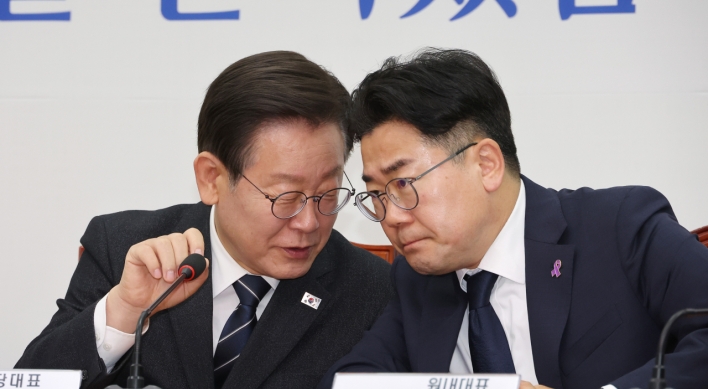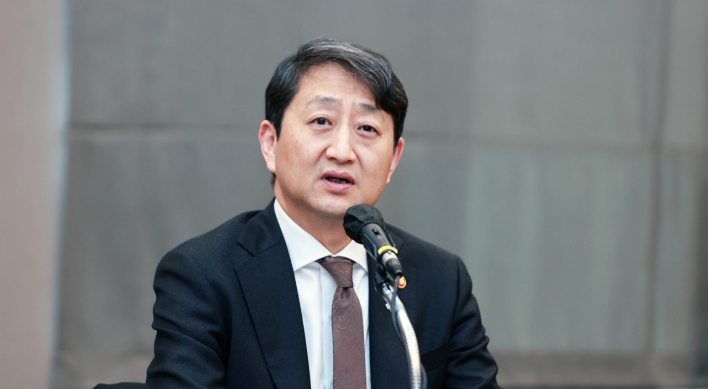Doctors' strike enters last day; another walkout imminent
By YonhapPublished : Aug. 28, 2020 - 20:22

South Korean doctors entered the last day of their three-day nationwide strike Friday to protest the country's medical reform scheme, with another walkout looming in early September amid the deepening tension between the government and physicians.
Tens of thousands of practitioners have joined interns and resident doctors at general hospitals for the walkout, raising their voice against the government's move to increase the number of medical students.
Earlier in the day, the government ordered not only trainee doctors in the wider Seoul area but all across the country to return to their work, warning of possible prison terms as it would cause major difficulties when the country is faced with spiking novel coronavirus cases.
The strike is the second of its kind and organized by the Korean Medical Association (KMA), which has some 130,000 members.
The widened order came after the government earlier ordered striking junior doctors at 95 trainee hospitals in the Seoul area to return to work.
The government also reported to police 10 doctors for violating the order issued earlier this week in the Seoul region, making good on its repeated warnings of strong legal action against those who failed to come back to hospitals.
On Wednesday, the government ordered striking trainee doctors and fellows working at training hospitals in Seoul, Gyeonggi Province and Incheon to return to work amid the rapid spread of new coronavirus cases in the capital area.
Those who do not follow the government order without an adequate reason could have their licenses revoked and even face imprisonment of less than three years or a fine of less than 30 million won ($25,000).
In a joint briefing held at the government complex in Seoul by the Ministry of Health and Welfare, the Ministry of Justice and the National Police Agency, Vice Health Minister Kim Ganglip said the extension and seeking of legal action were "inevitable" to "safeguard people's lives and safety," as the resurgence of the coronavirus was posing a great threat to public safety and the doctors' walkout added more trouble to already strained hospitals around the country.
However, the Korean Intern and Resident Association (KIRA) representing the trainee doctors, as well as fellow doctors, at major general hospitals has said it will continue its indefinite walkout as planned.
KIRA has made clear on numerous occasions that its members will not return to work unless the government reconsiders its plans, and a number of trainee doctors have submitted letters of resignation.
The government said the number of trainee doctors that have walked out stood at 6,593, or 75.8 percent, of the 8,825 interns and residents in the country as of Friday.
Among fellow doctors, 35.9 percent did not report to work during the day, it said.
Meanwhile, out of the 32,787 clinics in the country, 6.5 percent, or 2,141, were closed.
The justice ministry also reiterated that those who do not follow the government's order will face legal consequences. Doctors who are sentenced to a prison term are at risk of their medical license being revoked.
Choi Dae-zip, president of the Korean Medical Association, called the government's reporting of doctors to police "harsh oppression" in a press conference in front of the Seoul Metropolitan Police Agency.
Late Friday, the KMA said it plans to launch an indefinite strike starting Sept. 7 if its demands are not met.
Meanwhile, the government said the national exam that tests medical students' clinical skills, slated to take place from Sept.1 until Oct. 27, will proceed as scheduled, although 2,823 out of 3,172 medical students boycotted the test in protest.
Concerns are looming over service disruptions at major general hospitals, as trainee doctors have vowed to continue their collective actions indefinitely.
The walkout has forced major general hospitals in the greater Seoul area to reduce working hours, delay some scheduled surgeries and cancel appointments, routine checkups and tests.
Internal medicine at Seoul National University, one of the country's major general hospitals, said clinic hours will be shortened starting next week in a move to lessen the work of professor-level doctors.
Other medical workers, including nurses, have complained of their overloaded schedule, pleading that the government and the medical circle both find a breakthrough.
The walkout by practitioners at neighborhood clinics also caused some discomfort, but no major disruptions were reported due to the relatively low number of striking doctors.
Those who do not follow the government order without probable cause could have their licenses revoked and even face imprisonment of less than three years or a fine of less than 30 million won ($25,000).
As part of the country's medical workforce reform plan, the health ministry is planning to expand admission quotas at medical schools by 4,000 over the next 10 years, starting in 2022, and to open a new public medical school, as it seeks to broaden the reach of health care services.
This will increase the number of students admitted annually to medical schools to 3,458 in the 2022-2031 period from the current 3,058, according to the plan.
Professors of the Seoul National University Hospital released a joint statement later in the day that filing complaints against doctors will further paralyze the country's medical system.
"We need to prevent creating a serious vacuum in the country's medical system by driving young doctors into a corner," they said.
Medical professors of Korea University also expressed support for the strike, hinting they are willing to take group action as well. (Yonhap)



![[AtoZ Korean Mind] Does your job define who you are? Should it?](http://res.heraldm.com/phpwas/restmb_idxmake.php?idx=644&simg=/content/image/2024/05/06/20240506050099_0.jpg&u=)















![[K-pop's dilemma] Is Hybe-Ador conflict a case of growing pains?](http://res.heraldm.com/phpwas/restmb_idxmake.php?idx=642&simg=/content/image/2024/05/07/20240507050746_0.jpg&u=)